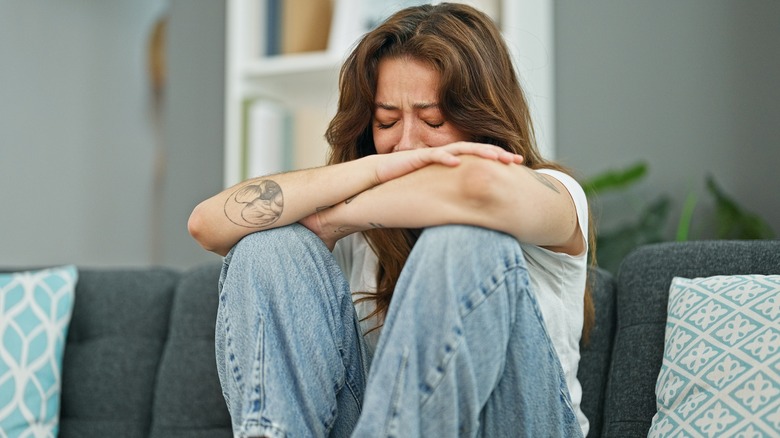Your On-Again, Off-Again Relationship Does More Harm Than You Realize
When it comes to relationships, nothing is quite as emotionally taxing as an on-again, off-again one. One moment, you're both happily getting along, the next, you're at each other's necks. So you breakup, you grieve, you say horrible things to each other, then you get back together — just so you can repeat the same cycle in a few weeks or months. Trying to break free from an on-again, off-again relationship may be on par with trying to escape Alcatraz. But while that's true, far too many people find themselves in these turbulent waters.
According to a 2011 study published in The Journal of Social Psychology, 60% of adults have experienced an on-again, off-again relationship, while a 2021 study published in Family Relations found that 33.6% of same-sex and different-sex couples had broken up at least once in their current relationship. Yikes. But just because this relationship style, if you want to call it that, worked for Carrie and Mr. Big in "Sex and the City," it doesn't mean that rekindling a relationship with a past love over and over again is for everyone or that it's even remotely healthy. In fact, all this relationship cycling does far more harm than you can possibly realize.
It causes emotional distress
Following a breakup, it can be tempting to think that the second time around, the relationship will be better. After all, you've already seen where you went wrong, so you know not to do it again. Unfortunately, this may not be the best decision for your mental health. One 2018 study published in Family Relations that analyzed 545 people in relationships found that those who had been through a previous breakup with their partner experienced higher levels of distress, including emotional and mental health issues.
Much of that has to do with the instability that these situations cause. When you're truly broken up, you at least have the assurance that the relationship is over. But when you're back together, the 'new' relationship may be on shaky ground, either from past resentment or anxieties about whether it will work this time. If the relationship had issues that were left unresolved the first time, there's the possibility that one person isn't truly over it but getting back in the relationship for convenience.
"We know that breakups are upsetting in-and-of themselves, but this distress is considered normal and is often temporary," explains assistant professor of human development and family science at the University of Missouri Kale Monk to Time. "However, a tumultuous pattern of stressful transitions in and out of the same relationship might have more pervasive implications for our well-being."
It allows for repeated toxic behavior
When a person takes someone back without any hesitation or consequences, it subtly communicates to their ex that they're forgiving them for their behavior. And though some people are capable of changing, if the couple doesn't talk it through, they may be at risk for falling into toxic behaviors.
According to a 2013 study published in The Journal of Marriage and Family, young adults involved in on-again, off-again relationships (relationship churning) are twice as likely to report physical abuse and 50% more likely to report verbal abuse than those in "stably together or stably broken up" relationships. Although the study acknowledged that young adult relationships are usually unstable by nature, with 40% of them being on-again, off-again, researchers still determined relationship churning to be the only common link among those with abusive patterns. It's also worth noting this study wasn't the only one to find a correlation between instability and abuse. A separate 2018 study published in the Journal of Interpersonal Violence found that among people who had experienced intimate partner abuse, relationship churners are "overrepresented." In other words, something about these on-again, off again relationships leaves such a lasting impact that even if one can break the cycle, they're still more likely to end up in abusive relationships.
It contributes to lowered self-esteem and poor decision-making
A 2012 study conducted at Kansas State University found a boatload of negative effects from relationship cycling. Not only did the research find these relationships reported poor communication and low partner satisfaction, they also contributed to impulsive decision-making, like getting married or having a baby without planning. The research also found that people in these relationships have lower self-esteem and higher rates of uncertainty about the future. Having serious doubts about one's future with their partner, but still moving in with them or having kids together is the very definition of a disaster waiting to happen.
"When cyclical couples break up, they tend to be ambiguous about ending the relationship," assistant professor of family studies and human services Amber Vennum tells Kansas State University. "So it can be unclear to one or both partners if they broke up and why they broke up, which leads to them continuing the romantic relationship. Other times the breakup won't be unilateral, so one person pursues the other until they get back together." Further research on the subject of cycling relationships by Vennum also found that those with these types of relationships who get married are more likely to have at least one trial separation during the first five years of marriage.
Hinders personal growth
Life is about growth. From every relationship we have, romantic or otherwise, we learn a lesson — or, perhaps, dozens of lessons — essential to our evolution as human beings. But when you keep going back to the same person, the same bad habits, the same toxic atmosphere, your ability to evolve and grow is thrown off course. You remain forever the same.
According to a 2013 study published in PLOS One, as much as breakups may take a toll on our heart, they're fantastic for helping us to evolve in a healthy and productive way. The research included two studies that found that breakup distress was important for personal growth because it promotes the necessary cognitive work that needs to be done after a breakup, like "ruminative reflection, brooding, and proclivity to rebound with new partners." You simply can't get that if you have one person in your life on repeat.
Of course, there are those on-again, off-again relationships that are able to prove the science wrong, but they are few and far between. Also, these relationships very likely to involve two mindful people who are dedicated to bettering themselves and each other after every breakup. Something that takes a lot of self-awareness and work — and loads of therapy too.




